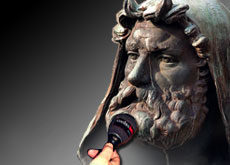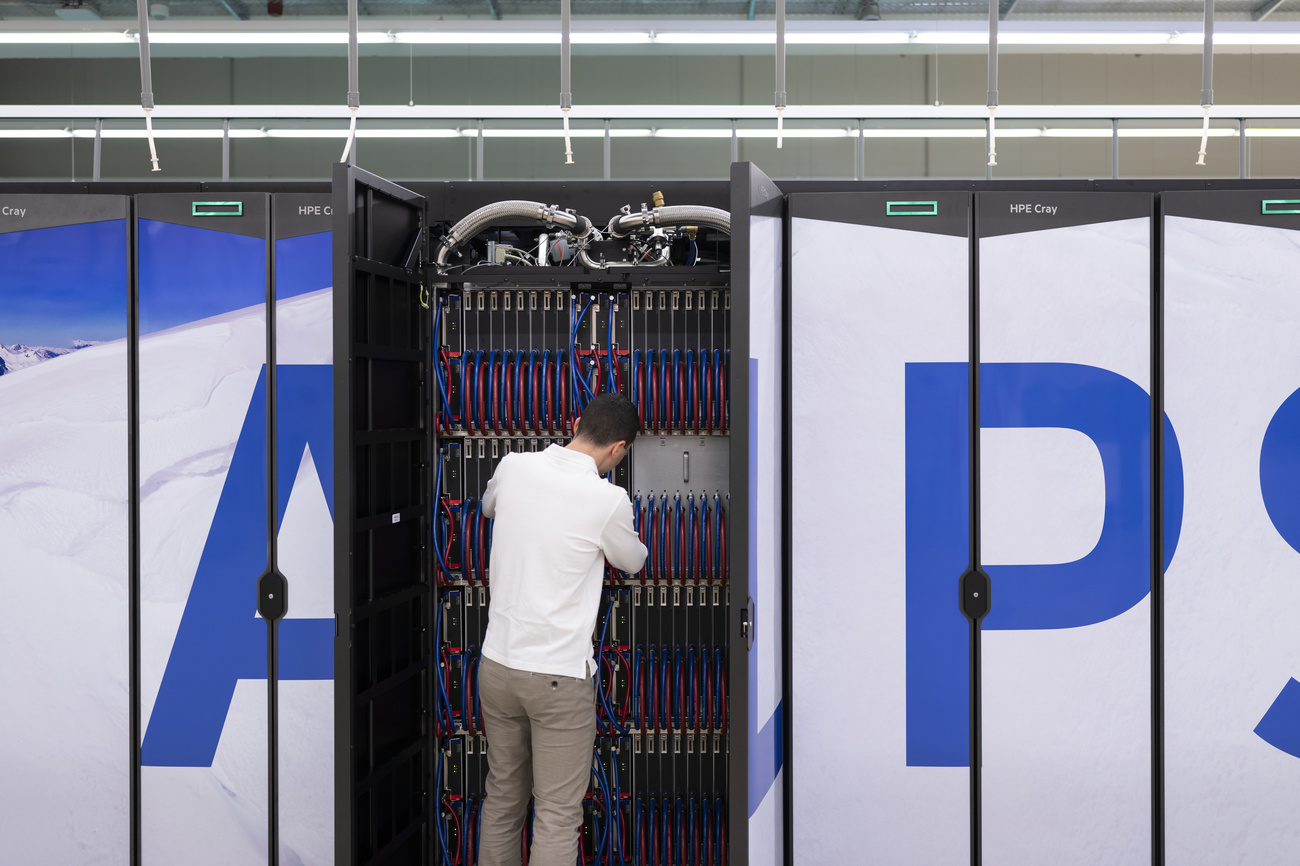National hero turns his back on Switzerland

To mark National Day on August 1, swissinfo has obtained an exclusive interview with a national hero.
William Tell talks about the years during which he slipped out of the history books and shares his views of Switzerland today.
Tell made his mark on history in 1307, when he was famously forced to shoot an apple off his son’s head.
It is early morning when the legendary Swiss hero greets us in the well-appointed retirement home where he now lives with his African girlfriend. He says he’s still doing the odd job to keep himself busy.
His clothing is worn by time, his face creased by seven centuries of history. But the gaze is still sharp, eyes flashing with hope and, at times, disillusionment.
swissinfo: In 1307 you survived events that would test the strength of any man. How do you remember that famous year?
William Tell: I don’t share the obsession with those days. Other people made a legend of what happened. Me, I have my work. What I did wasn’t so heroic after all.
swissinfo: Many would disagree. And many people wonder what became of your son.
W.T.: He came through beautifully, in every sense of the word! A few years after the apple incident, when the first statue was sculpted in my honour, I urged him to go and discover the world.
Like me, he was a very good navigator. He went to sea and travelled all over. It became his passion. Sometimes he’d come and visit. Had it not been for my son, I would probably never have been able to handle being cooped up in Switzerland. He allowed me to dream, to escape for a while.
swissinfo: After the acts which made you legendary, you disappeared completely from history. What did you do during all those years?
W.T.: I watched the Swiss and it was fascinating to see how they handled, manipulated and tinkered with me… I was really intrigued by the many faces they gave me.
swissinfo: You have been used by the political Left and Right, by advertisers and as a symbol of quality… Does that make you a bit of an opportunist?
W.T.: Certainly not. But the inhabitants of this country could be described like that. They created the hero and changed him to suit their needs and desires.
I’m a simple man, a mountain dweller who tried to do his duty, that’s all. Can you believe that the William Tell you’re talking to worked as a caretaker in a large company? I also worked in one of Swissair’s maintenance workshops at Zurich airport.
swissinfo: After all these experiences, how do you view the Switzerland of today?
W.T.: During the years when I went from one odd job to another, I was pretty discouraged at times. I felt this country couldn’t come to terms with the difficult memories of the last war, hiding behind a heroism that never existed.
And then I saw this symbol of quality – me with my crossbow – being misused. I also watched the incompetence of bosses at the big companies and finally I saw Switzerland joining the rat race.
I’m telling you, had I dared, I would have followed the biggest trend of all… I would have gone to see a shrink.
swissinfo: You paint a somewhat bleak picture. But did you also have some good times?
W.T.: Yes, I had a great time on the shores of Lakes Neuchâtel, Biel and Murten in 2002 at the National Exhibition.
I have to confess that I went every day, incognito of course. It was fantastic. I’m a man of the lake and I rediscovered my roots. I finally saw a Switzerland which did not cobble together tired old myths like mine. It was a mature Switzerland – noble and audacious – which dared to stage such an extraordinary event.
After a few months of bliss, I was suddenly brought crashing down to earth. That same year people turned against foreigners once again. Tell me, why does this country harbour this morbid fear of foreigners? Why the defensiveness?
swissinfo: A political shift followed with gains by the rightwing…
W.T.: That’s my greatest sadness: the rise to power of petty bailiffs who lay claim to my name, but who have just a single goal – money, money, money.
They represent a Switzerland obsessed with getting rich and remaining isolated from the rest of the world. And they’re willing to destroy the foundations of federalism in the process.
I, William Tell, can’t stomach this anymore. I must admit that modern-day Switzerland depresses me.
swissinfo: Our interview with you is being published on August 1. Do you have any plans for National Day?
W.T.: My African girlfriend and I have decided to visit a small village in French-speaking Switzerland. We’ll have a laugh and raise a glass or two.
But I have to say that my impression is that August 1 means little these days.
swissinfo: Do you have any plans for the coming days and months?
W.T.: Since this is the last interview I’ll ever give, I’ll give you a scoop: I’m getting the hell out of here, I’m leaving Switzerland once and for all.
But before I go, I’ll pay a visit to the Rütli Meadow [cradle of the Swiss Confederation]. My girlfriend and I were given tickets to see a play being performed there in my honour.
Then I’ll be moving along, because I’m a man for all seasons who doesn’t belong anywhere in particular.
In a few weeks’ time I’ll cross the mountains into Italy. I’ll visit the family of my son’s mother – my former lover. I’ll also see my great-grand-children, who work in Brussels for the European Union and for the United Nations in New York.
Then, I’ll go and join the William Tell of today, that true hero of freedom… Nelson Mandela.
Afterward, I’ll disappear into the mountains and fade away. You know, legends aren’t supposed to last forever. People have to create their own destinies.
swissinfo-interview: Alexandra Richard
In the role of William Tell: anthropologist and sociologist Bernard Crettaz
Bernard Crettaz, who is the voice of William Tell on this occasion, comes from the mountains of canton Valais, where he was born in 1938.
He worked for the Museum of Anthropology in Geneva (European section) from 1975 to 2003.

In compliance with the JTI standards
More: SWI swissinfo.ch certified by the Journalism Trust Initiative









You can find an overview of ongoing debates with our journalists here . Please join us!
If you want to start a conversation about a topic raised in this article or want to report factual errors, email us at english@swissinfo.ch.